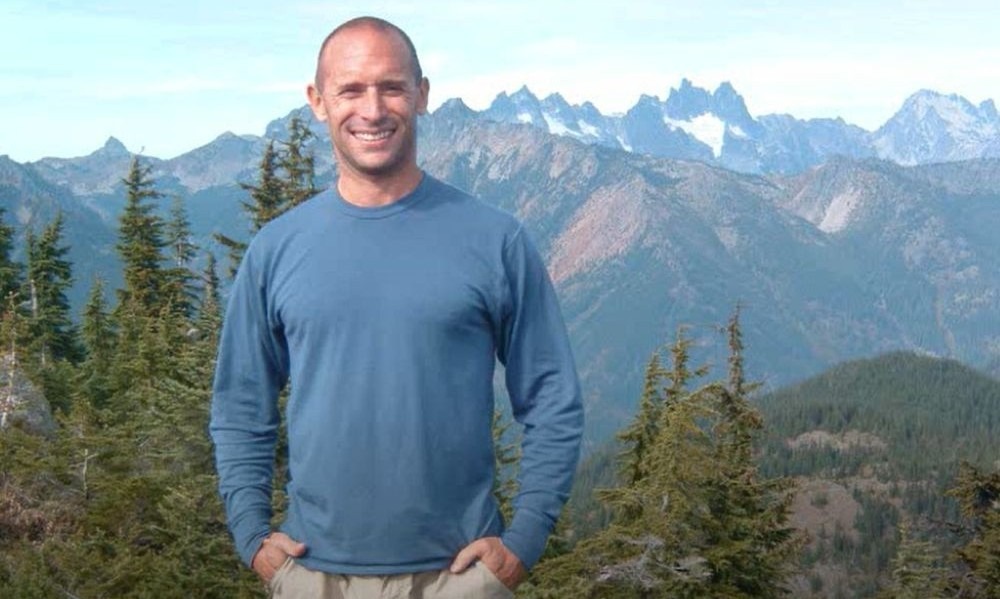Timber wars in the 1980s featured lines of logging trucks and name calling at hearings. Conservationists were labeled “birdwatchers,” and they retaliated by labeling loggers as “timber beasts.” Sen. Slade Gorton, getting costumed for battle, stopped outside Forks long enough to put on a plaid shirt.
Mitch Friedman, as a young UW graduate, was in the midst of that fracas. He led sit-ins at Forest Service offices and unearthed stakes laying out logging roads. He then discovered how to actually get stuff done. The ensuing strategy Friedman lays out in his new book Conservation Confidential: A Wild Path to a Less Polarizing and More Effective Activism. It is a tale of both migration of wildlife and his own change of mind. The objective of both is to find common ground.
The outfit Friedman heads, Conservation Northwest, is committed to protecting habitat, restoring wildlife populations, and creating migration corridors. Conciliation, rather than confrontation, is the path Friedman has now taken. His rationale for this shift: “Why the hell would we choose to antagonize people who still care about clean air and water and who love wildlife? Even those who make money from the logging of big trees may have admiration for primeval forests. Even those who fear grizzly bears or despise wolves may have respect and admiration for their power and beauty, perhaps even their ecological functions.”
Conservation Northwest has raised and devoted resources to lands in Central and Eastern Washington along the U.S.-Canada border. It has committed to repopulating these environs with wolves, grizzlies, and Canadian lynx. Friedman makes the case and outlines measures whereby wolves and ranchers can coexist. He relates a big win in preserving the Loomis Forest, prime lynx habitat.
At the northeast corner of the North Cascades, just east of the Pasayten Wilderness, lie about 25,000 acres of state-owned land once slated to be clearcut. Friedman used the lynx as a cause célèbre, tapped into the philanthropy of our new-tech rich folk, and ransomed the land. When the State Board of Natural Resources jacked up the price tag to forgo logging, the Paul Allen Foundation put up the money.
The 7,480-foot summit of Chopaka Mountain provides great vistas of the Loomis Forest and Pasayten. I’ve been there, hunkered down at the summit through a thunder storm. In his book, however, Friedman takes readers down into the trenches.
He displays an amount of ego, is proud of his achievements, and generous toward staff who have conceived strategies. In discussing how conservation and lumbering can coexist in the Kettle Range, he is complimentary about Duane Vaagen, an owner of the namesake mill up in Colville.
The book correctly points out the insular righteousness of some in the environmental movement: “Just because an idea fits on a bumper sticker does not mean it solves problems in the world.” Friedman admits to engaging in monkey wrenching, pulling up roadway stakes, and “dabbling” in a more dangerous tactic: “I also once spiked a stand of old growth forest, which may have been a reason why it still stands.”
In retrospect, however, he regrets sabotaging of logging equipment owned by “a small family business” outside Bellingham, which was logging second and third-growth trees, not prized old growth, on private land.
Friedman pays tribute to such “heroes” of conservation as John Muir, David Brower, and Aldo Leopold. He also is critical of them: “The philosophical fathers of modern conservation greatly underestimated the extent of Native human influence on ecosystems.” In short, this book is the tale of a young activist who grew up and has helped chart a course for his movement.
In reading this book, I’m reminded of the scene outside a crab feed Democratic fundraiser down in South Bend. A teenage girl held up a sign reading “Support Green New Deal.” U.S. Rep. Derek Kilmer sat down beside her, quietly explaining why incremental measures — such as his Wild Olympics wilderness bill — are preferable to amorphous pie-in-sky congressional resolutions.
The Earth is heating up, but the political climate for Friedman’s causes has gotten warmer as well. Our Northwest economy has transformed and is no longer dependent on logging and mining. The region has grown, with wild lands a prime attraction, drawing people to a region that hasn’t been used up.
Friedman may have earned the nickname, “Mainstream Mitch.”
This article also appears in Cascadia Advocate.
Discover more from Post Alley
Subscribe to get the latest posts sent to your email.

A great read, and such a great environmental gift to all of us who still revere our wild places. Definitely a book to check out.
Our wild places are well worth the battle to keep them safe. Anyone sensitive, in any way, to the destrution human’s can reign on our beautiful natural resources, knows how hard the fight can be. Money and instant gratification too often result in the permanent loss of our forests, lakes and lands. Thanks, once again, for a great article and pointing us to a resource for continuing the resistance/fight in a more meaningful way.
Thanks for the article about Mitch & Conservation NW. It is such a great & ecologically common-sense organization! Everyone, please consider joining. I was a volunteer when I lived in Bellingham and am still a member over 20 years later since moving to the southwest corner of the state.